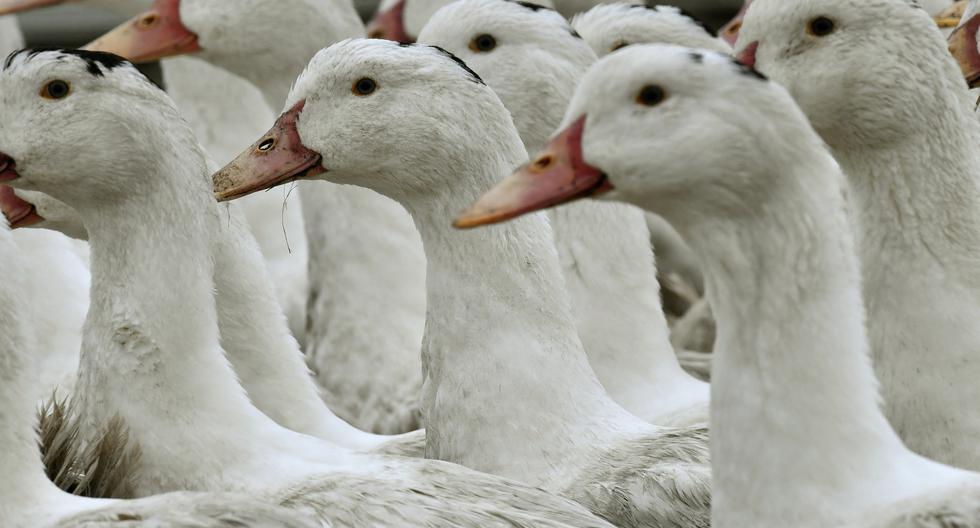What is the flu avianHow does it affect humans? What are its symptoms and how dangerous is it? These are some of the questions that some people ask themselves in view of the increase in cases of dead birds as a result of avian influenza (H5N1) in the country.
The National Agrarian Health Service (Senasa), on November 24, declared a health alert for 180 days (until May 2023) after confirming the presence of avian influenza (H5N1) in wild birds such as pelicans. A few days later, thousands of dead birds are reported, especially pelicans, along the Peruvian coast, especially in Lima and northern regions.
This problem was also registered in the European winter, where they had to slaughter more than 55 million birds, due to an unprecedented epidemic. But how can this disease affect humans? Is it deadly?
WHAT IS BIRD FLU?
Influenza A (H5N1), also known as bird flu, is an infectious disease that mainly affects birds and is caused by a virus from the Orthomyxoviridae family.
Depending on its subtype, it can be classified as low pathogenic or highly pathogenic, presenting different symptoms in infected birds. However, some highly pathogenic strains of avian influenza have the capacity to infect humans, posing a threat to public health. The disease can be deadly.
HOW CAN I CATCH AVIAN FLU?
As explained by Centers for Disease Control and Prevention, National Center for Immunization and Respiratory Diseases (NCIRD)infected birds carry the avian influenza virus, through these three ways:
Infections in humans with avian influenza viruses can occur when the virus enters a person’s eyes, nose, or mouth, or if the person inhales them. This can happen when the virus is in the air (in droplets or possibly dust) and a person breathes it in, or possibly if a person touches something contaminated with the virus and then touches their mouth, eyes, or nose.
WHEN WAS THE FIRST CASE OF AVIAN FLU IN HUMANS RECORDED?
The world’s first human case of bird flu was reported in Hong Kong in 1997 and was named avian influenza (H5N1). The outbreak was linked to chickens. The likelihood of a global human outbreak increases the further the bird flu virus spreads.
HOW DANGEROUS CAN AVIAN FLU BE TO HUMANS?
More than a dozen types of avian influenza have been identified, including the two strains that have most recently infected humans and are the most dangerous: H5N1 and H7N9. When avian influenza spreads to humans it can be deadly.
Statistics suggest that it can kill more than half of the people it infects, but the number of deaths remains low because few people have had avian influenza. Fewer than 500 bird flu deaths have been reported to the World Health Organization since 1997.
How can a bird flu condition in humans be complicated?
People with avian influenza can develop life-threatening complications, including:
- Pneumonia
- Conjunctivitis
- Respiratory insufficiency
- kidney dysfunction
- heart problems
WHAT ARE THE SYMPTOMS OF AVIAN FLU?
Avian influenza infections in humans can cause illness ranging from a mild upper respiratory tract infection (fever and cough) to rapid progression to severe pneumonia, acute respiratory distress syndrome, shock, and even death.
Symptoms
- Eye redness (conjunctivitis)
- Cough
- Fever
- Throat pain
- Runny nose
- Muscle or body pain
- Headache
- Fatigue
- Difficulty breathing
A runny nose is one of the symptoms (Photo: Pixabay)
Less frequent
- Diarrhea
- Nausea
- vomiting
- seizures
WHAT IS THE TREATMENT FOR AVIAN FLU?
There is no specific treatmentbut according to the WHO antiviral drugs, particularly the neuraminidase inhibitor (oseltamivir, zanamivir), can reduce the duration of viral replication and improve survival prospects.
WHAT CAUSES A HIGHER RISK OF CONTRACTING INFLUENZA A (H5N1)?
In accordance with MedlinePlusthe risk of contracting the bird flu virus is higher in the following cases:
- Work with poultry (like farmers).
- Travel to countries where the virus is present.
- Touching an infected bird.
- Entering a building with sick or dead birds, their feces, or litter from infected birds.
- Eating raw or undercooked blood, eggs, or meat from infected birds.
DOES EATING CHICKEN OR EGG INCREASE THE RISK OF GETTING AVIAN FLU?
No, but you must have certain considerations when cooking and handling it. Because heat destroys avian viruses, cooked poultry does not present a health risk. However, it is important to take precautions when handling and preparing poultry that may be contaminated with salmonella or other bacteria. These are the recommendations of Mayo Clinic:
- Avoid cross contamination: use hot, soapy water to wash cutting boards, utensils, and all surfaces that have come in contact with raw poultry.
- Perform a full cook: cook the chicken until its juices are clear and until it reaches a minimum internal temperature of 165 °F (74 °C).
- Avoid raw eggs: Since eggshells are often contaminated with bird droppings, avoid meals that contain undercooked or raw eggs.

















